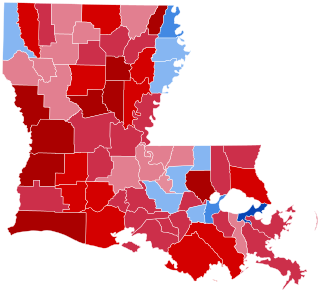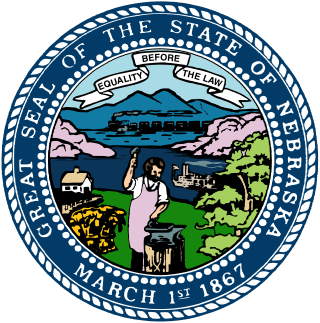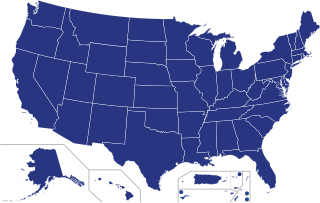
Each of the 50 U.S. states, the District of Columbia, and five territories of the United States holds either primary elections or caucuses to help nominate individual candidates for president of the United States. This process is designed to choose the candidates that will represent their political parties in the general election.

From January 19 to June 8, 2004, voters of the Republican Party chose its nominee for president in the 2004 United States presidential election. Incumbent President George W. Bush was again selected as the nominee through a series of primary elections and caucuses culminating in the 2004 Republican National Convention held from August 30 to September 2, 2004, in New York City.

From January 3 to June 5, 2012, voters of the Democratic Party chose its nominee for president in the 2012 United States presidential election. President Barack Obama won the Democratic Party nomination by securing more than the required 2,383 delegates on April 3, 2012, after a series of primary elections and caucuses. He was formally nominated by the 2012 Democratic National Convention on September 5, 2012, in Charlotte, North Carolina.

Presidential primaries and caucuses of the Republican Party took place within all 50 U.S. states, the District of Columbia, and five U.S. territories between February 1 and June 7, 2016. These elections selected the 2,472 delegates that were sent to the Republican National Convention. Businessman and reality television personality Donald Trump won the Republican nomination for president of the United States.

This article contains the results of the 2016 Republican presidential primaries and caucuses, the processes by which the Republican Party selected delegates to attend the 2016 Republican National Convention from July 18–21. The series of primaries, caucuses, and state conventions culminated in the national convention, where the delegates cast their votes to formally select a candidate. A simple majority (1,237) of the total delegate votes (2,472) was required to become the party's nominee and was achieved by the nominee, businessman Donald Trump of New York.
This article includes the entire 2016 Democratic Party presidential primary schedule in a format that includes result tabulation. Below are the vote totals for everyone that appeared on the ballot during the 2016 Democratic presidential primaries. Two candidates, Bernie Sanders and Hillary Clinton, appeared on all 57 ballots. Two others, Martin O'Malley and Rocky De La Fuente, appeared in over 30 states and six others appeared on between two and ten states. Nearly 20 appeared on only New Hampshire's ballot. As of June 8, Hillary Clinton was considered the presumptive nominee according to media organizations. On July 26, the second day of the Democratic National Convention, Clinton was confirmed the Democratic nominee for the 2016 United States presidential election.

The 2016 United States presidential election in Louisiana was held on Tuesday, November 8, 2016, as part of the 2016 United States presidential election in which all 50 states plus the District of Columbia participated. Louisiana voters chose electors to represent them in the Electoral College via a popular vote, pitting the Republican Party's nominee, businessman Donald Trump, and running mate Indiana Governor Mike Pence against Democratic Party nominee, former Secretary of State Hillary Clinton, and her running mate Virginia Senator Tim Kaine. Louisiana has eight electoral votes in the Electoral College.

The 2016 United States presidential election in Nebraska was held on Tuesday, November 8, 2016, as part of the 2016 United States presidential election in which all 50 states plus the District of Columbia participated. Nebraska voters chose electors to represent them in the Electoral College via a popular vote, pitting the Republican Party's nominee, businessman Donald Trump, and running mate Indiana Governor Mike Pence against Democratic Party nominee, former Secretary of State Hillary Clinton, and her running mate Virginia Senator Tim Kaine. Nebraska has five electoral votes in the Electoral College, two from the state at large, and one each from the three congressional districts.

The 2016 United States presidential election in Florida was held on Tuesday, November 8, 2016, as part of the 2016 United States presidential election in which all 50 states plus the District of Columbia participated. Florida voters chose electors to represent them in the Electoral College via a popular vote, pitting the Republican nominee, businessman Donald Trump, and his running mate Indiana Governor Mike Pence, against the Democratic nominee, former U.S. Secretary of State Hillary Clinton, and her running mate Virginia Senator Tim Kaine. Florida had 29 electoral votes in the Electoral College.

The 2016 United States presidential election in Arizona was held on Tuesday, November 8, 2016, as part of the 2016 United States presidential election in which all 50 states plus the District of Columbia participated. Arizona voters chose electors to represent them in the Electoral College via a popular vote, pitting the Republican nominee, businessman Donald Trump, and running mate Indiana Governor Mike Pence against Democratic nominee, former Secretary of State Hillary Clinton, and her running mate Virginia Senator Tim Kaine. Arizona has 11 electoral votes in the Electoral College.

The 2016 United States presidential election in Delaware was held on Tuesday, November 8, 2016, as part of the 2016 United States presidential election in which all 50 states plus the District of Columbia participated. Delaware voters chose electors to represent them in the Electoral College via a popular vote, pitting the Republican Party's nominee, businessman Donald Trump, and running mate Indiana Governor Mike Pence against Democratic Party nominee, former Secretary of State Hillary Clinton, and her running mate Virginia Senator Tim Kaine. Delaware has three electoral votes in the Electoral College.

The 2016 United States presidential election in Oregon was held on Tuesday, November 8, 2016, as part of the 2016 United States presidential election in which all 50 states plus the District of Columbia participated. Oregon voters chose electors to represent them in the Electoral College via a popular vote, pitting the Republican Party's nominee, businessman Donald Trump, and running mate Indiana Governor Mike Pence against Democratic Party nominee, former Secretary of State Hillary Clinton, and her running mate Virginia Senator Tim Kaine. Oregon has seven electoral votes in the Electoral College.

The 2016 United States presidential election in Hawaii was held on Tuesday, November 8, 2016, as part of the 2016 United States presidential election in which all 50 states and the District of Columbia participated. Hawaii voters chose electors to represent them in the Electoral College by a popular vote, pitting the Republican Party's nominee, businessman Donald Trump, and running mate Indiana Governor Mike Pence against Democratic Party nominee, former Secretary of State Hillary Clinton, and her running mate Virginia Senator Tim Kaine. Hawaii has four electoral votes in the Electoral College.

The U.S. Virgin Islands did not participate in the November 8, 2016 general election because it is a territory and not a state. However, the five non-incorporated territories that send Delegates to the House of Representatives did participate in the presidential primaries.
The Northern Mariana Islands did not participate in the November 8, 2016 general election for President of the United States, because it is a territory and not a state. However, the five non-incorporated territories that send delegates to the House of Representatives participated in the presidential primaries of both major parties.

Presidential primaries and caucuses of the Republican Party took place in many U.S. states, the District of Columbia, and five U.S. territories from February 3 to August 11, 2020, to elect most of the 2,550 delegates to send to the Republican National Convention. Delegates to the national convention in other states were elected by the respective state party organizations. The delegates to the national convention voted on the first ballot to select Donald Trump as the Republican Party's nominee for president of the United States in the 2020 election, and selected Mike Pence as the vice-presidential nominee.

The 2000 American Samoa Democratic presidential caucuses were held on March 7, 2000, as part of the 2000 Democratic Party primaries for the 2000 presidential election. 3 delegates to the 2000 Democratic National Convention were allocated to the presidential candidates, the contest was held on Super Tuesday alongside primaries and caucuses in 15 other states.

Although American Samoa will not participate in the 2000 presidential election because it is a U.S. territory and not a state, it participated in the U.S. presidential primaries and caucuses for both the Democratic and Republican parties.

The 2000 Puerto Rico Democratic presidential caucuses were held on April 2, 2000, as part of the Democratic Party primaries for the 2000 presidential election. 58 delegates to the Democratic National Convention were allocated to presidential candidates.

Although Puerto Rico does not participate in U.S. presidential general elections because it is an unincorporated territory and not a state, and therefore cannot send members to the U.S. Electoral College, Puerto Ricans are citizens of the United States and participate in the U.S. presidential primaries and caucuses.















